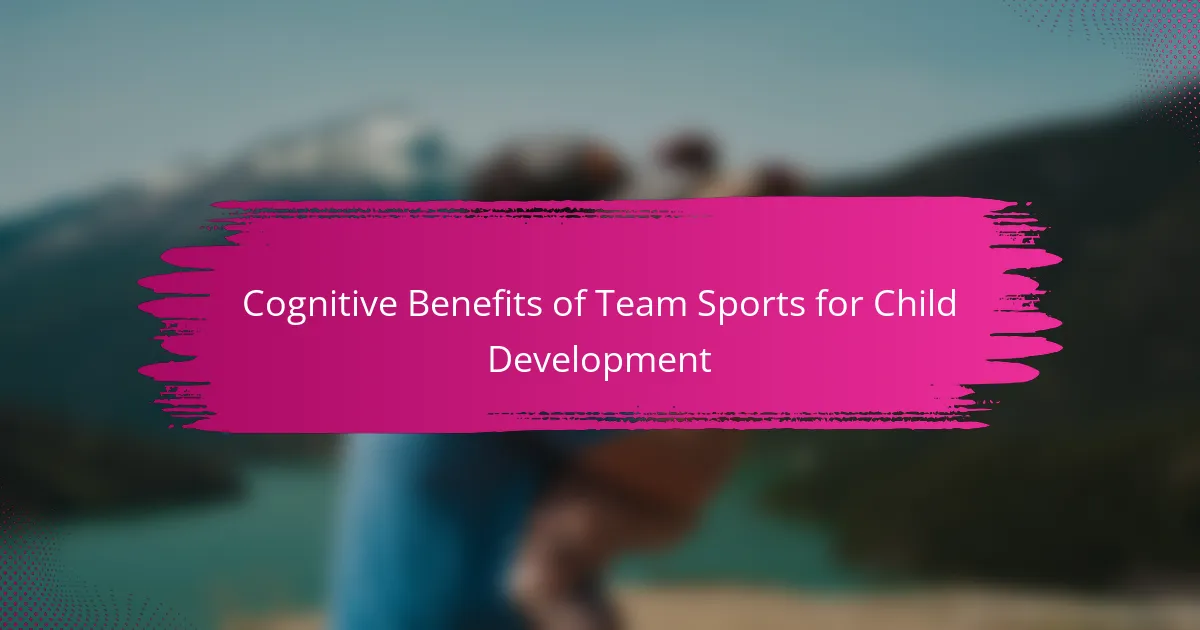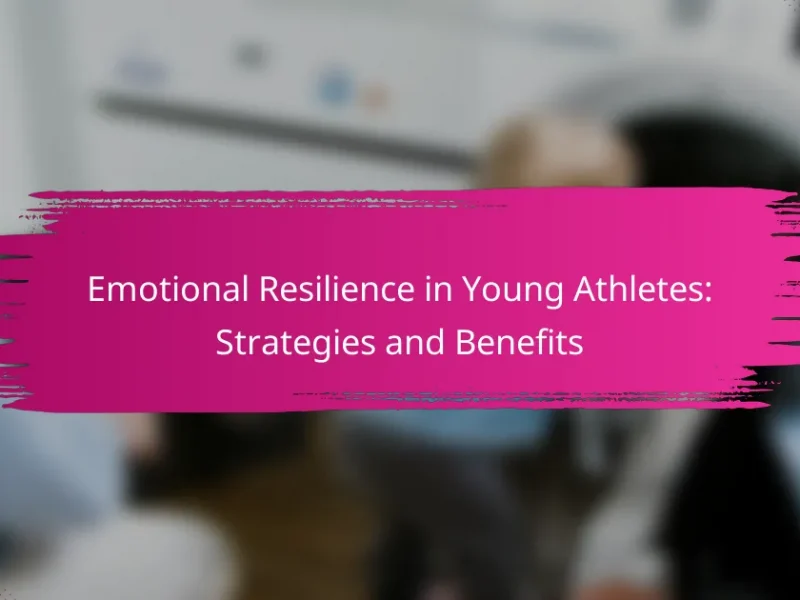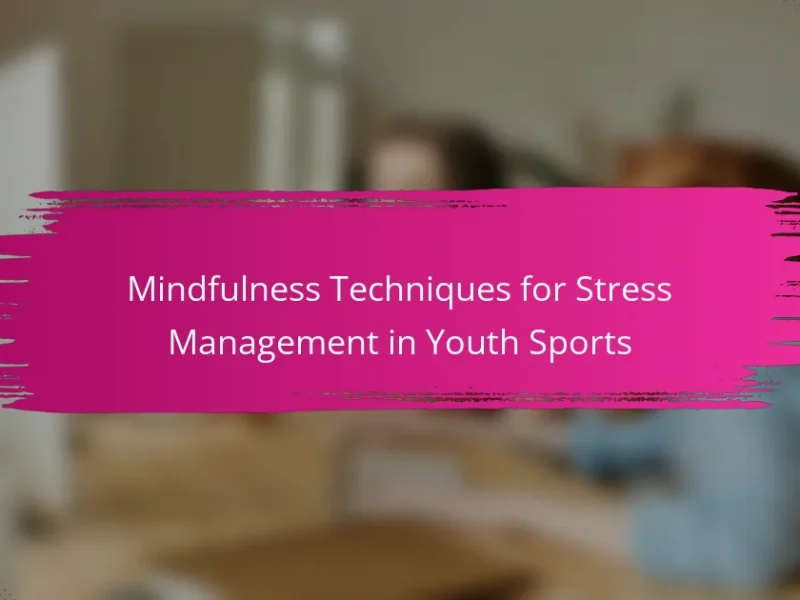Team sports significantly enhance cognitive development in children. They improve teamwork, communication, and problem-solving skills. Participation fosters critical thinking and emotional intelligence. Engaging in team sports is linked to better academic performance and the development of leadership abilities.
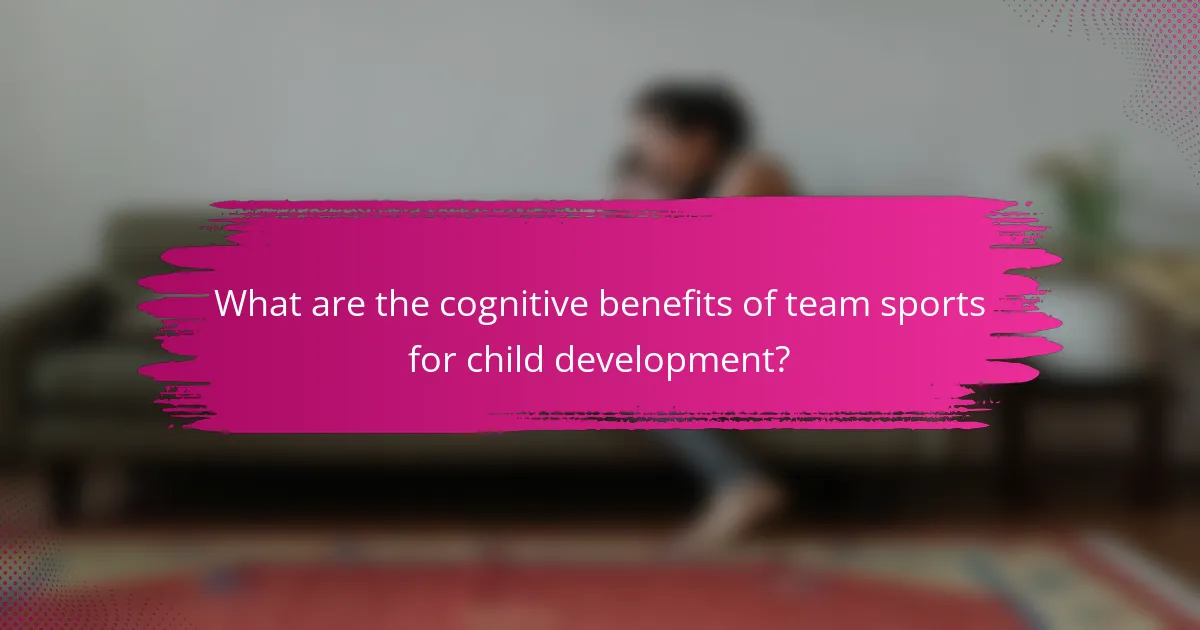
What are the cognitive benefits of team sports for child development?
Team sports significantly enhance cognitive development in children by improving teamwork, communication, and problem-solving skills. Participation fosters critical thinking as children learn to strategize and adapt during games. Social interactions in team settings boost emotional intelligence, helping kids understand and manage their emotions. Research indicates that regular engagement in team sports can lead to improved academic performance, as physical activity is linked to better concentration and memory retention. Moreover, children develop leadership skills and resilience through collaborative experiences, which are essential for their overall growth.
How do team sports enhance problem-solving skills?
Team sports significantly enhance problem-solving skills in children. Engaging in team sports fosters collaboration and communication, essential for resolving conflicts and strategizing.
Children learn to assess situations quickly, weigh options, and make decisions under pressure. For example, during a game, players must adapt their strategies based on opponents’ actions, honing their analytical skills.
Moreover, teamwork requires players to consider diverse perspectives, enhancing their ability to approach problems creatively. This unique attribute of team sports contributes to cognitive flexibility, essential for effective problem-solving in various contexts.
Research shows that children involved in team sports exhibit improved critical thinking skills, which can lead to better academic performance and social interactions.
What role does teamwork play in cognitive growth?
Teamwork in team sports significantly enhances cognitive growth in children. Collaborative activities foster critical thinking, problem-solving, and communication skills. Engaging in team sports encourages children to make quick decisions and develop strategic thinking. Studies show that children involved in team sports demonstrate improved social skills and emotional regulation, contributing to overall cognitive development. Additionally, the unique attribute of shared goals in team sports promotes a sense of belonging, further stimulating cognitive engagement.
How can team sports improve communication abilities?
Team sports significantly enhance communication abilities in children. Through collaboration, they learn to express ideas clearly and listen actively. Participating in team dynamics fosters verbal and non-verbal communication skills. As a result, children develop better interpersonal relationships, which are essential for their overall cognitive development. Team sports also encourage conflict resolution, teaching children to navigate disagreements constructively. These experiences contribute to their emotional intelligence, a unique attribute that supports effective communication.
What impact do team sports have on emotional intelligence?
Team sports significantly enhance emotional intelligence in children. They foster skills such as empathy, teamwork, and conflict resolution. Participating in team sports encourages children to understand and manage their emotions, leading to improved social interactions. Studies show that children involved in team sports exhibit higher levels of emotional awareness and regulation, which are crucial components of emotional intelligence.
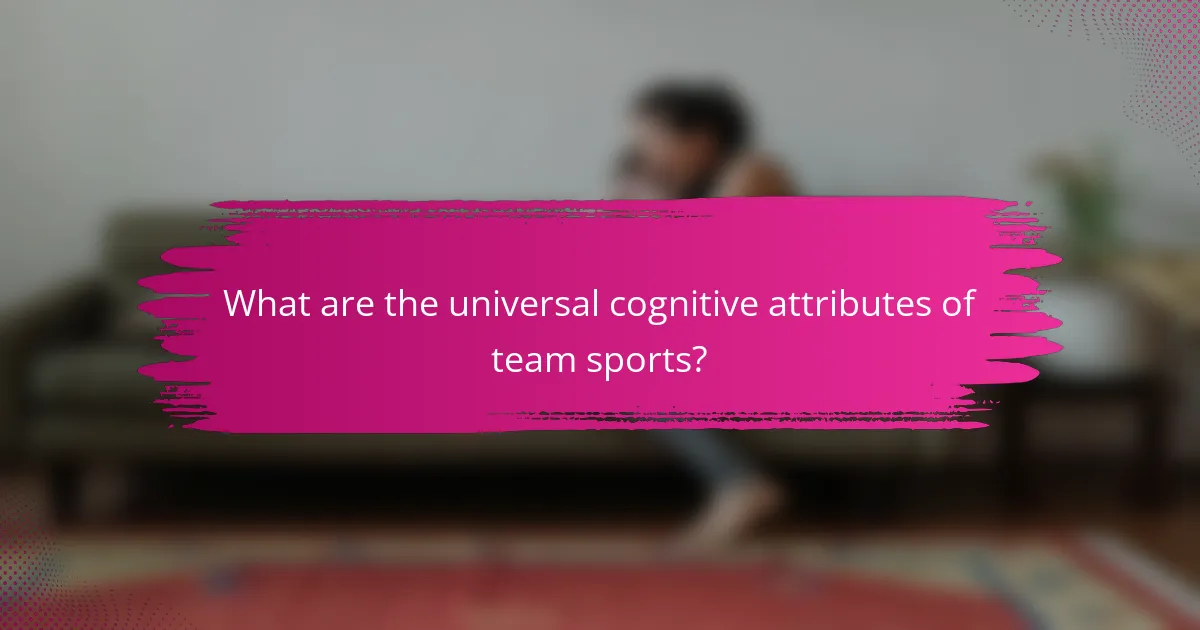
What are the universal cognitive attributes of team sports?
Team sports enhance cognitive development in children by fostering teamwork, communication, and strategic thinking. These activities promote social skills, improve decision-making, and boost self-esteem. Children learn to collaborate, resolve conflicts, and understand group dynamics, which are essential life skills. Moreover, participation in team sports has been linked to improved academic performance, as physical activity stimulates brain function and cognitive abilities.
How do team sports foster critical thinking?
Team sports enhance critical thinking by encouraging strategic decision-making and problem-solving. Players analyze situations quickly, evaluate options, and anticipate opponents’ moves. This dynamic environment fosters cognitive flexibility, essential for adapting to new challenges. Research indicates that children involved in team sports show improved analytical skills and creativity, contributing to their overall cognitive development. Engaging in these activities not only builds teamwork but also sharpens individual critical thinking abilities, preparing them for future academic and life challenges.
What is the connection between physical activity and cognitive function?
Engaging in team sports significantly enhances cognitive function in children. Physical activity fosters brain development, improving memory, attention, and problem-solving skills. Research indicates that children participating in team sports exhibit better academic performance and social skills. These benefits stem from the combination of physical exertion and the collaborative nature of team activities, which promote critical thinking and emotional regulation.
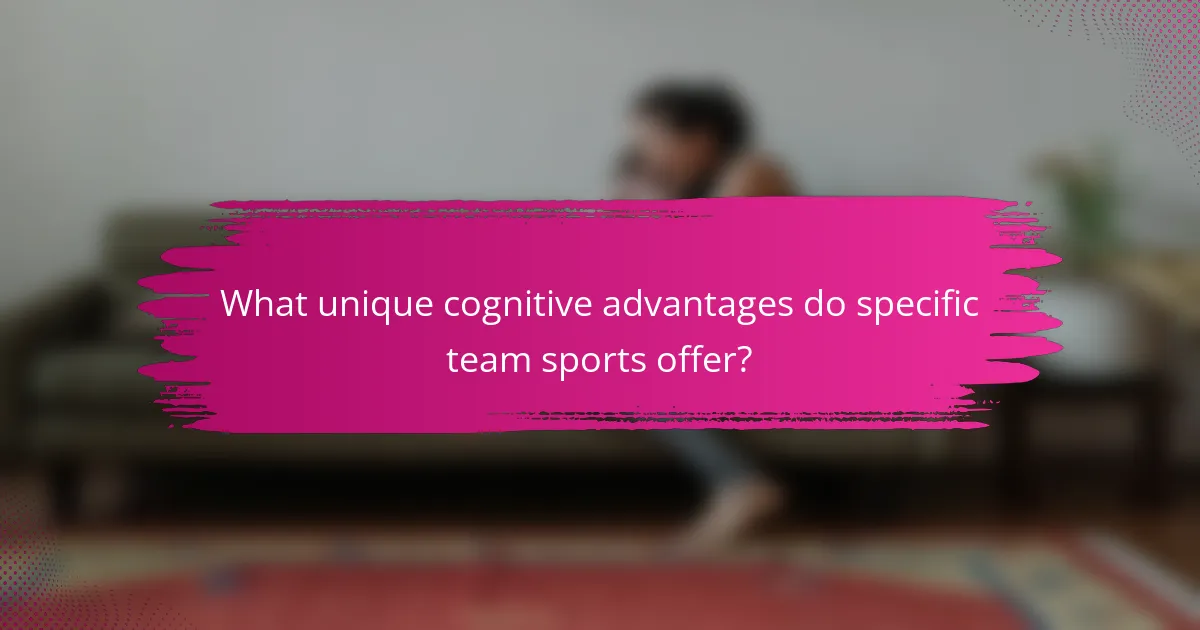
What unique cognitive advantages do specific team sports offer?
Team sports provide unique cognitive advantages for child development, enhancing skills like teamwork, communication, and strategic thinking. These activities foster social interaction, which improves emotional intelligence and conflict resolution skills. Research shows that children engaged in team sports exhibit better academic performance due to improved focus and discipline. Additionally, the collaborative nature of team sports cultivates leadership abilities, as children learn to motivate and guide their peers.
How does soccer promote strategic thinking?
Soccer enhances strategic thinking through teamwork, decision-making, and problem-solving. Players must assess situations quickly, anticipate opponents’ moves, and devise tactics, fostering cognitive development. Research indicates that engaging in team sports like soccer improves executive functions, including planning and flexibility. These skills are vital for children’s overall growth and academic success.
What cognitive skills are developed through basketball?
Basketball enhances various cognitive skills in children, including decision-making, teamwork, and strategic thinking. These skills develop through the game’s fast-paced nature, which requires players to assess situations quickly and collaborate effectively.
Additionally, basketball fosters spatial awareness and hand-eye coordination, as players must navigate the court and interact with the ball and other players. Research shows that engaging in team sports like basketball can lead to improved academic performance and higher levels of concentration in children.
The unique attribute of basketball is its emphasis on real-time problem-solving, which sharpens cognitive flexibility. This sport encourages children to think critically and adapt to changing circumstances on the court.
As a result, the cognitive benefits gained from playing basketball contribute significantly to overall child development, shaping skills that extend beyond the game itself.
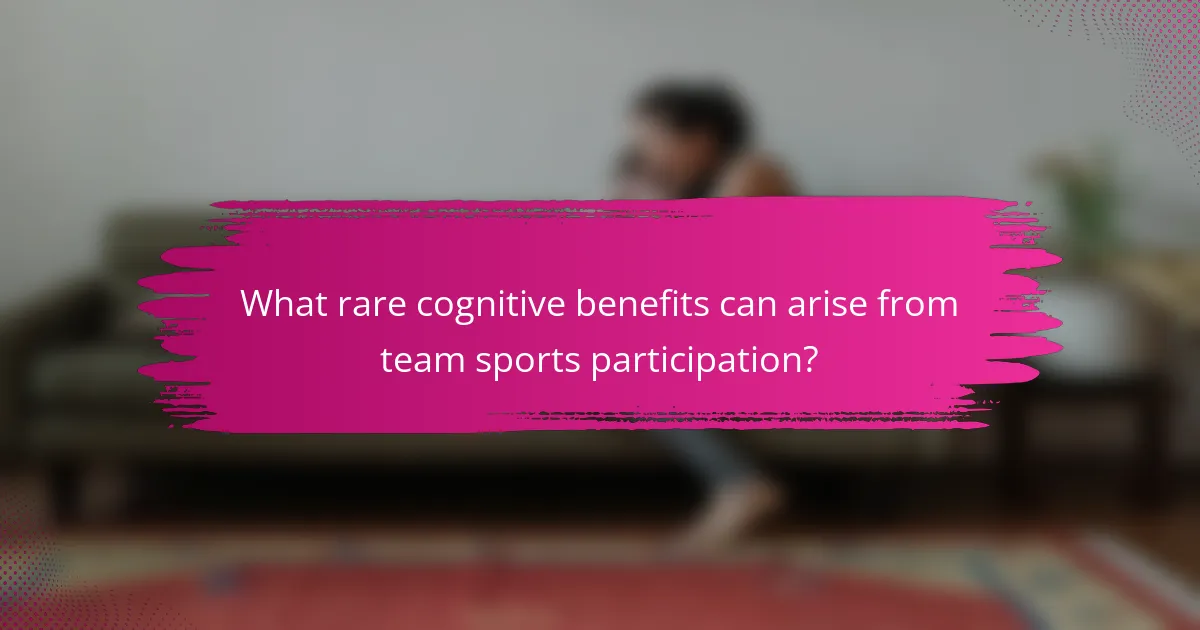
What rare cognitive benefits can arise from team sports participation?
Participation in team sports can lead to rare cognitive benefits such as enhanced problem-solving skills, improved social cognition, and increased emotional intelligence. These benefits arise from the collaborative environment of team sports, where children learn to navigate complex social dynamics and develop critical thinking abilities. Research indicates that engaging in team activities fosters a sense of belonging, which can enhance cognitive flexibility and resilience. Furthermore, children involved in team sports often exhibit better decision-making skills under pressure, a unique attribute that sets them apart from peers not engaged in similar activities.
How can team sports lead to enhanced creativity in children?
Team sports enhance creativity in children by promoting collaboration and problem-solving skills. Engaging in team activities encourages children to think outside the box and develop innovative strategies. Studies show that children involved in team sports exhibit higher levels of cognitive flexibility, allowing them to adapt their thinking to new situations. Additionally, the social interactions in team sports foster communication skills, which are crucial for creative expression. As a result, children learn to appreciate diverse perspectives, further enriching their creative potential.
What are the long-term cognitive effects of early team sports involvement?
Early involvement in team sports significantly enhances cognitive development in children, fostering skills like teamwork and problem-solving. Research indicates that children engaged in team sports show improved academic performance and better social skills. These long-term cognitive benefits stem from the unique attribute of collaborative learning inherent in team sports, which encourages communication and strategic thinking. As a result, children develop not only physically but also mentally, laying a foundation for lifelong cognitive abilities.
How do cultural attitudes towards team sports influence cognitive benefits?
Cultural attitudes towards team sports significantly enhance cognitive benefits in child development. Supportive cultures promote teamwork, communication, and problem-solving skills. For instance, children in cultures that value collaboration may show improved social cognition and emotional intelligence. These cognitive benefits arise from regular engagement in team activities, fostering critical thinking and adaptability. As a result, children develop essential life skills that prepare them for future challenges.
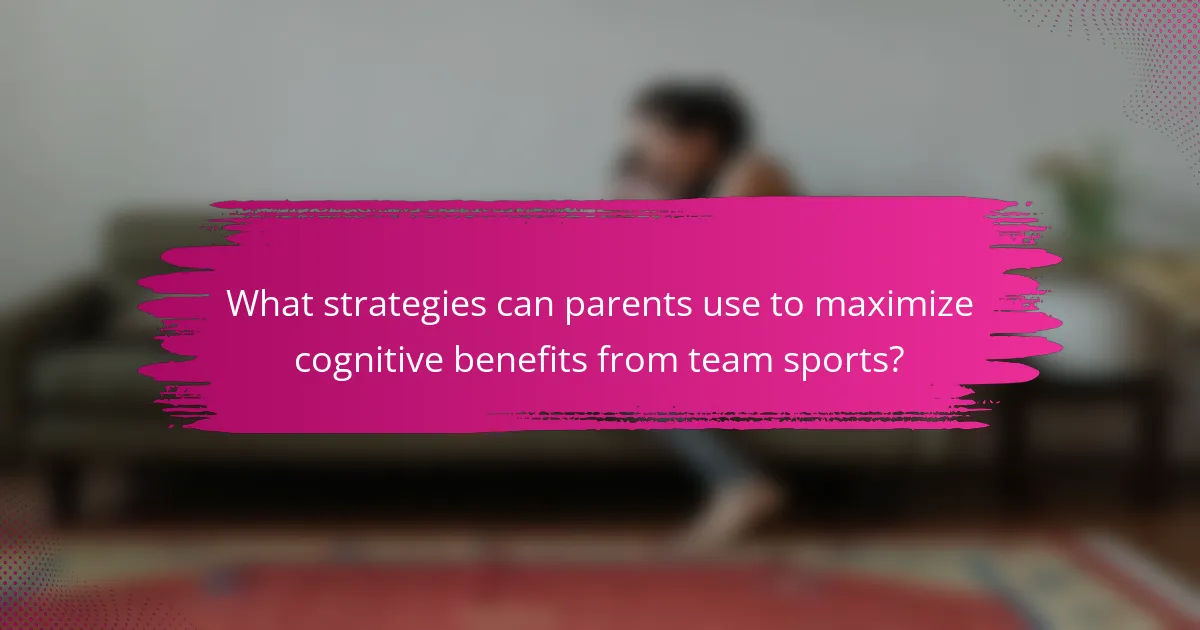
What strategies can parents use to maximize cognitive benefits from team sports?
Parents can maximize cognitive benefits from team sports by fostering teamwork, communication, and strategic thinking. Encourage children to engage in discussions about game strategies, which enhances critical thinking and problem-solving skills.
Additionally, setting specific goals for skill improvement can boost focus and motivation. Parents should also emphasize the importance of sportsmanship, teaching children to manage emotions and resolve conflicts, which contributes to emotional intelligence.
Incorporating regular feedback on performance can help children reflect on their experiences, promoting self-awareness and adaptability. Lastly, ensuring a balanced approach between competition and enjoyment can sustain long-term interest and cognitive engagement in sports.
What common mistakes should parents avoid when encouraging team sports?
Parents should avoid pressuring children to excel in team sports. This can lead to anxiety and diminish enjoyment. Instead, focus on fostering teamwork and communication skills. Emphasizing fun and participation enhances cognitive benefits, such as improved social skills and problem-solving abilities. Encouraging a positive attitude towards competition can also help children learn resilience and adaptability. Additionally, overlooking the importance of age-appropriate activities may hinder development; ensure that sports align with their physical and emotional maturity.
How can coaches support cognitive development in young athletes?
Coaches can significantly enhance cognitive development in young athletes through structured team interactions and strategic gameplay. They foster critical thinking, problem-solving, and teamwork skills, which are essential for mental growth.
Coaches can implement specific strategies to support cognitive benefits. They can encourage athletes to analyze game situations, make quick decisions, and communicate effectively with teammates. This engagement stimulates cognitive processes and enhances learning.
Research indicates that participation in team sports can improve executive functions such as memory, attention, and self-regulation. These cognitive skills are vital for academic success and personal development.
Additionally, coaches can create a positive environment that promotes resilience and adaptability. Encouraging young athletes to face challenges and learn from failures builds a growth mindset, further supporting their cognitive development.
What best practices should be followed for effective team sports engagement?
Effective team sports engagement fosters cognitive benefits in children. To achieve this, focus on collaboration, communication, and strategic thinking. Encourage active participation, emphasizing teamwork to enhance social skills. Regular feedback helps children understand their roles and contributions, reinforcing their cognitive development. Incorporate varied activities to stimulate problem-solving and adaptability.
